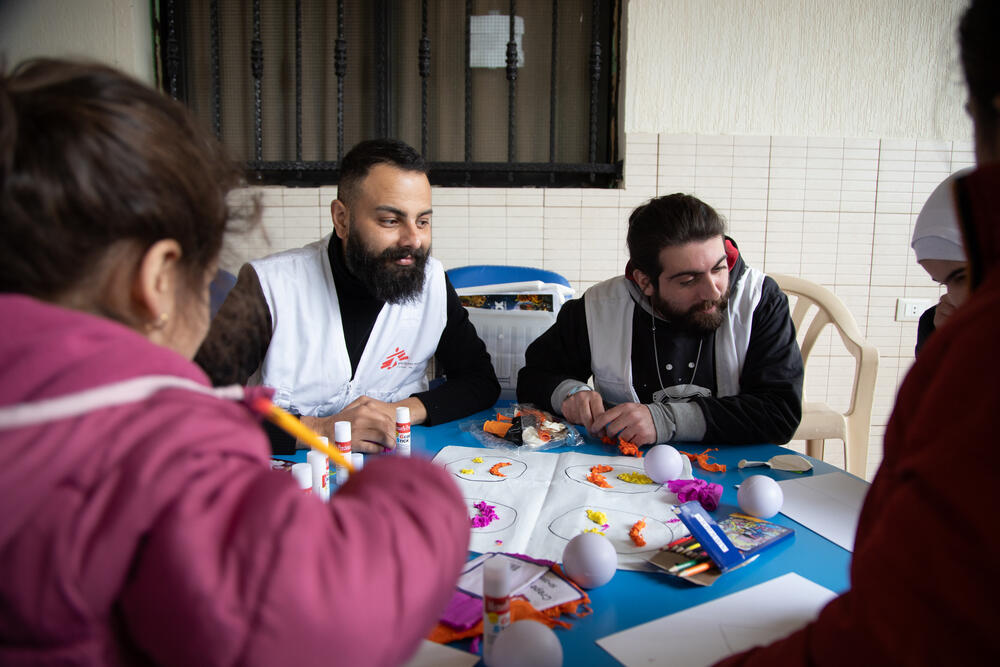Lebanon: MSF boosts emergency response as Israeli attacks continue
Since the ceasefire between Lebanon and Israel first came into effect on 27 November 2024, Israeli forces have continued to engage in military operations in southern Lebanon.
Hundreds of thousands of people have returned to their homes and villages in southern Lebanon, while many who saw their homes destroyed by the Israeli bombardment remain displaced. Others are still unable to return home due to the continued Israeli military presence in their towns and villages.
Both returning and displaced communities are facing significant challenges in accessing medical care. This is due to damaged infrastructure, understaffed healthcare facilities and the costs of medical treatment – which is unaffordable to many after they lost their livelihoods during the conflict.
Continuing strikes
In response, Médecins Sans Frontières / Doctors Without Borders (MSF) has expanded its activities in southern Lebanon over the past 60 days, deploying three mobile medical teams to 11 towns in the Nabatieh governorate.
This is in addition to our two mobile medical teams which already visit towns in the South governorate. These teams are providing essential medical services to address critical healthcare gaps in some of the worst affected areas.
“Throughout the ceasefire since November, and still today, Israeli forces continue to open fire, carry out strikes, and demolish civilian infrastructure, causing daily devastation and civilian casualties in southern Lebanon,” says Francois Zamparini, emergency coordinator for MSF in Lebanon.
“The hardships of these communities are greatly aggravated; people are already struggling to cope with their losses and the impact of the war.”
Vulnerable communities, like refugees and migrant workers, face even greater challenges.
According to the Ministry of Public Health, 83 people have been killed and at least 228 others have been injured by Israeli forces in Lebanon since the announced ceasefire on 27 November.

Help us prepare for the next emergency
Rebuilding and recovery
“The scale of the destruction is massive. Towns have been reduced to rubble, with homes, schools, and farmlands wiped out,” says Zamparini.
Over 90,000 structures – including homes, businesses, agricultural facilities, schools, and water infrastructure – have been damaged or destroyed by the bombardment across the country, according to the United Nations Development Programme.
“MSF is committed to supporting the people during this recovery period and ensuring that they are not left without essential medical care as they start to rebuild their lives,” adds Zamparini.
Across the country, our 15 mobile medical teams provide primary healthcare services, medications for chronic illnesses, health education, mental health support, and post-operative nursing care.
From the announcement of the ceasefire in November 2024 to 15 January 2025, our teams in southern Lebanon have provided over 19,000 general medical consultations, conducted 3,427 health awareness and education sessions, and supported over 3,000 individuals with mental health services. And this vital work continues.
Patients with complicated medical conditions are referred to the Public Emergency Turkish Hospital in Saida City, where MSF is working in partnership with the Ministry of Public Health to deliver free, high-quality trauma, emergency, and surgical care to all the communities in Lebanon.
Beyond healthcare, MSF teams are also addressing immediate humanitarian needs across the country.
In the heavily bombarded Bint Jbeil district, our teams are donating essential relief items. We have already delivered 7,000 blankets, 4,000 mattresses, 5,820 hygiene kits, as well as 2,015 floor mats and other necessities to support the war-affected communities as they rebuild their lives.
Our teams are also actively coordinating with several affected hospitals in the area to offer support, such as donations of fuel and 19,270 medical items, and training medical staff to deal with emergencies.
“Serious efforts must be made to ensure safety for the civilian population, healthcare facilities and staff,” says Zamparini.
“Any escalation of violence or breaches of the ceasefire would further jeopardise the health and wellbeing of thousands of families in southern Lebanon who have already lost so much.”
MSF and the crisis in Lebanon
Intense airstrikes and ground incursions by Israeli forces led to the mass displacement of people in Lebanon, where the healthcare system was already struggling to meet people’s needs. Throughout the conflict and since the ceasefire that followed, MSF teams have worked to provide urgent humanitarian aid and medical assistance.

